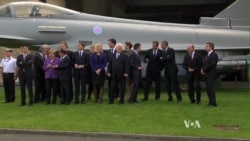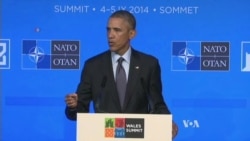President Barack Obama said Friday that the creation of a NATO "rapid-reaction" force will serve as a signal to Russia to avoid any future potential aggression similar to the ongoing fighting in Ukraine.
The force, which will consist of several thousand ground troops, with naval, air and special forces units in support, will be staffed on a rotating basis by member countries, and will be ready to deploy on a few days’ notice.
NATO Secretary-General Anders Fogh Rasmussen said earlier the force would be designed in particular to bolster the security of the former Soviet satellite states that are now part of the 28-member alliance, such as Poland or the three Baltic nations of Latvia, Estonia and Lithuania.
Watch a related video report by Luis Ramirez from Wales:
Speaking to reporters at the summit site in Wales, President Obama said that he was hopeful that the cease-fire announced earlier Friday by Ukraine and Russian-backed rebels would hold.
"Our alliance is fully united in support of Ukraine's sovereignty, independence and territorial integrity, and its right to defend itself," he said.
"With respect to the ceasefire agreement, obviously we are hopeful but based on past experience also skeptical that in fact the separatists will follow through and the Russians will stop violating Ukraine's sovereignty and territorial integrity," he said. "So it has to be tested."
But he also underscored that the rapid-reaction force was a demonstration of NATO’s central concept known as Article V: that an attack on one alliance member is considered an attack on all alliance members.
“We mean what we say when we talk about our Article V presence, and an increased presence serves as an additional deterrent to any more Russian aggression we might see,” Obama said.
Economic sanctions imposed by Washington and European Union nations against Russia could be lifted if the cease-fire holds, he said, but he also that the US and its allies were preparing new sanctions.
"Today the United States and Europe are finalizing measures to deepen and broaden our sanctions across Russia's financial, energy and defense sectors," Obama told reporters.
Britain will contribute 3,500 personnel to the rapid-reaction force, Prime Minister David Cameron said. It's unclear what other contributions from other NATO members will entail.
The force will have bases ready in several NATO countries in Eastern Europe, potentially the Baltic States, Poland and Romania, with equipment and supplies in storage and a small command, planning and communications staff on site.
“The decision we have taken today to prepare a readiness action plans sends a very, very clear message to Russia that we are strongly determined to take all steps necessary to provide effective protection and defense of our allies," Rasmussen said.
He called the decision an appropriate response to the “dramatically changed security environment in Europe.”
NATO also announced that its 2016 summit will be hosted by Poland, which Rasmussen said was symbolic of the alliance’s commitment to its eastern members.
Rasmussen also welcomed the cease-fire agreement in eastern Ukraine, but indicated some skepticism about whether it will hold.
“One thing of course is to declare a cease-fire. The next and crucial step, of course, is to implement it in good faith, and that remains to be seen. But so far, so good," he said.
NATO leaders also agreed on more cooperation on the crisis in Iraq, and Rasmussen welcomed military and humanitarian involvement by several allies, including the United States.
The alliance may help coordinate some support functions, like airlift, but, he said, NATO will have no role inside Iraq unless invited by the Iraqi government, and even then probably only for training.
He also said NATO leaders agreed to share information on their citizens who go to Iraq to fight with the militants and then try to return to Europe or North America.
The ministers also agreed to engage with the new, incoming Iraqi government, to try to improve the situation in northern Iraq, where radical militants from the Islamic State have seized wide swaths of territory and terrorized residents.






